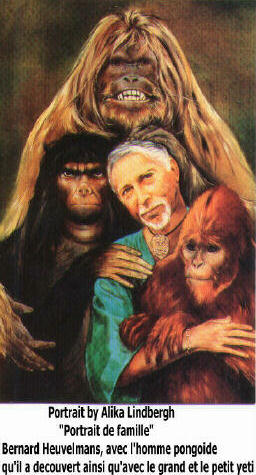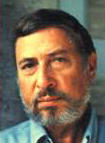Bigfoot Encounters
http://www.bigfootencounters.com
Bernard Heuvelmans
(1916 - 2001)
 Switzerland's Museum
of Zoology of Lausanne informed cryptozoologists worldwide, the morning
of 24 August 2001, of the death of Dr. Bernard Heuvelmans, 84, the Father
of Cryptozoology. This is sad news. His towering presence in the field leaves
a long shadow. His influence is great. Heuvelmans' contributions to cryptozoology,
zoology, and anthropology are significant and far-reaching, and his impact
on generations to come will cross decades.
Switzerland's Museum
of Zoology of Lausanne informed cryptozoologists worldwide, the morning
of 24 August 2001, of the death of Dr. Bernard Heuvelmans, 84, the Father
of Cryptozoology. This is sad news. His towering presence in the field leaves
a long shadow. His influence is great. Heuvelmans' contributions to cryptozoology,
zoology, and anthropology are significant and far-reaching, and his impact
on generations to come will cross decades. Bernard Heuvelmans was born in Le Havre, France on October 10, 1916, of a Dutch mother and of a Belgian father. Heuvelmans found he had a love of natural history from an early age.
His interest in unknown animals was first piqued as a youngster by his reading of science-fiction adventures such as Jules Verne's Twenty Thousand Leagues Under the Sea and Sir Arthur Conan Doyle's The Lost World.
After earning his doctoral degree before World War II with a thesis on the classification of the hitherto unclassifiable teeth of the ardvaark, Heuvelmans spent the next years writing about the history of science. But when he read a 1948 Saturday Evening Post article, in which biologist Ivan T. Sanderson sympathetically discussed the evidence for relict dinosaurs, he decided to pursue a vague, unfocussed interest in a systematic way.
From then on Heuvelmans sought evidence in scientific and literary sources. Within a few years he had amassed so much material that he was ready to write a large book. That book turned out to be Sur la piste des betes ignorees, published in 1955 and better known in its English translation three years later as On the Track of Unknown Animals. Almost five decades later, the book remains in print, with an excess of one million copies sold in various translations and editions, including one in 1995, with a large updated introduction.
 The
book's impact was enormous. As one critic remarked at the time, "Because
his research is based on rigorous dedication to scientific method and
scholarship and his solid background in zoology, Heuvelmans's findings
are respected throughout the scientific community." Soon Heuvelmans
was engaged in massive correspondence as his library and other researches
continued. In the course of letter-writing, he invented the word "cryptozoology"
(it does not appear in On the Track). That word saw print for the first
time in 1959 when French wildlife official Lucien Blancou dedicated a
book to the "master of cryptozoology." Heuvelmans corresponded
with many cryptozoologists worldwide, as he did with me, sometimes for
decades. By the 1960s, most in the field had elevated Blancou's phrase
in honor of Heuvelmans, and Heuvelmans was now being called the "Father
of Cryptozoology."
The
book's impact was enormous. As one critic remarked at the time, "Because
his research is based on rigorous dedication to scientific method and
scholarship and his solid background in zoology, Heuvelmans's findings
are respected throughout the scientific community." Soon Heuvelmans
was engaged in massive correspondence as his library and other researches
continued. In the course of letter-writing, he invented the word "cryptozoology"
(it does not appear in On the Track). That word saw print for the first
time in 1959 when French wildlife official Lucien Blancou dedicated a
book to the "master of cryptozoology." Heuvelmans corresponded
with many cryptozoologists worldwide, as he did with me, sometimes for
decades. By the 1960s, most in the field had elevated Blancou's phrase
in honor of Heuvelmans, and Heuvelmans was now being called the "Father
of Cryptozoology."
Writing in Cryptozoology in 1984, Heuvelmans said, "I tried to write about it according to the rules of scientific documentation." Because of the unorthodox nature of his interests, however, he had no institutional sponsorship and had to support himself with his writing. "That is why," he wrote, "I have always had to make my books fascinating for the largest possible audience."
Heuvelmans and his book influenced the investigative work of cryptozoology supporter Tom Slick. Sanderson, who influenced Heuvelmans, in turn was influenced by Heuvelmans. Heuvelmans served as a confidential consultant, along with such intellectual early contributors like anthropologist George Agogino and zoologist Ivan Sanderson, on Slick's secret board of advisors. Heuvelmans was asked to examine the "Yeti skullcap" brought back by Sir Edumund Hillary's World Book expedition of 1960. He was also one of the first to declare it was a ritual object made from the skin of a serow, a small goatlike animal found in the Himalayas. Heuvelmans' extensive files on the Slick expeditions remained mostly unpublished until he contributed them for inclusion in the 1989 book, Tom Slick and the Search for the Yeti.
On the Track of Unknown Animals was concerned exclusively with land animals. The second of Heuvelmans' landmark works to be translated into English, In the Wake of the Sea-Serpents (1968), covered the ocean's unknowns, including the recognized but still in some ways enigmatic giant squid.
In 1968, Heuvelmans (at Sanderson's invitation) examined what was represented to be the frozen cadaver of a hairy hominoid, the subject of his L'homme de Neanderthal est toujours vivant (with Boris Porshnev, 1974). Other books, none yet translated into English, include works on surviving dinosaurs and relict hominids in Africa.
Heuvelmans's Center for Cryptozoology, established in 1975, was first housed near Le Bugue in the south of France, but in the 1990s, moved to LeVesinet, closer to Paris. It consisted of his huge private library and his massive files. Heuvelmans was elected president when the International Society of Cryptozoology was founded in Washington, D.C., in 1982. He held that position until his death. He also was involved with the British Columbia Scientific Cryptozoology Club and other efforts for active cryptid studies globally. In a 1984 interview he expressed the desire to write a 20-volume cryptozoology encyclopedia, but no volume has appeared to date, owing to the death of a translator and other problems.
Down through the years, without fanfare, Heuvelmans journeyed from the shores of Loch Ness to the jungles of Malaysia, interviewing witnesses and examining the evidence for cryptids. He produced a few articles along the way, and infrequently was gave news interviews. But beginning in the 1990s, he began to avoid media events. For example, when a television network asked in 1994 and 1995, to tape an interview with Heuvelmans about the Minnesota Iceman, he would not come to America to do it, and then refused to be filmed in France. Although he had had a French television program on natural history mysteries almost two decades earlier, he routinely refused most mainstream interviews in the last decade of his life. He also hardly ever trekked to formal meetings. For many of us in North America, visiting with him, for example, at an early 1980s gathering in New York City, will now always be a delightful and rare memory. When in February 1997, he was awarded the Gabriele Peters Prize for Fantastic Science at the Zoological Museum of the University of Hamburg, Germany, he was unable to appear to collect the prize of 10,000 Marks (about $6000) and sent his friend, journalist, and cryptozoologist Werner Reichenbach, to accept on his behalf.
Heuvelmans's health began to more rapidly fail in the mid-1990s, although he would try to continue to work on completing his grand plan for his writings of the multi-volume encyclopedia. By 2001, many of us were dismayed to find he was mostly bedridden and in very poor health. In 1999, he donated his vast holdings in cryptozoology to The Museum of Zoology of Lausanne in Switzerland.
A list of Heuvelmans's books follows:
1955 Sur la piste
des bêtes ignorées. Paris: Plon.
1958 Dans le sillage des monstres marins - Le Kraken et le Poulpe Colossal.
Paris: Plon.
1958 On the Track of Unknown Animals. London: Hart-Davis.
1959 On the Track of Unknown Animals. New York: Hill and Wang
1965 Le Grand-Serpent-de-Mer, le problème zoologique et sa solution.
Paris: Plon.
1965 On the Track of Unknown Animals. (Abridged, revised.) New York: Hill
and Wang.
1968 In the Wake of Sea Serpents. New York: Hill and Wang.
1975 Dans le sillage des monstres marins - Le Kraken et le Poulpe Colossal.
Paris: François Beauval : 2nd édition revue et complétée.
1975 Le Grand-Serpent-de-Mer, le problème zoologique et sa solution.
Paris: Plon, 2nd édition revue et complétée.
1978 Les derniers dragons d'Afrique. Paris: Plon.
1980 Les bêtes humaines d'Afrique. Paris: Plon.
1995 On the Track of Unknown Animals. London: Kegan Paul International.
Heuvelmans, Bernard,
and Boris F. Porchnev
1974 L'homme de Néanderthal est toujours vivant. Paris, Plon.
In his waning years, his mind was filled with worries that no one would credit him for what he had done. He need not have troubled himself. Heuvelmans said he merely wanted to be remembered as "The Father of Cryptozoology." He will be recalled thusly for his efforts on behalf of the new science, as well as his personality and scholarship. Bernard Heuvelmans, dead at 84, will hardly be forgotten.
Nevertheless, Heuvelmans'
friendship, fresh insights, and frisky humor will be missed.
Photo top right courtesy
John Kirk 1997
Photo middle left via Michal Raynal's website 2001
Back to Articles?
Back to What's New?
Back to Newspaper & Magazine Articles
Home/Main
Portions of this website are reprinted under the Fair Use Doctrine of International Copyright Law as educational material without benefit of financial gain. This proviso is applicable throughout the entire website at www.bigfootencounters.com
- ---